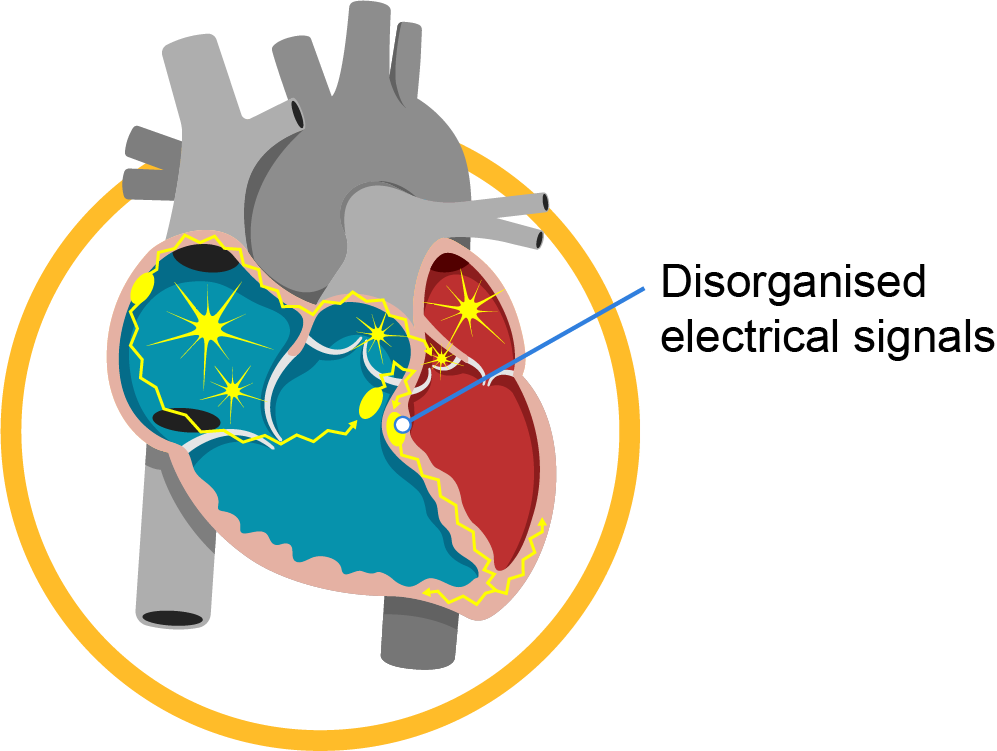
Arrhythmia is a term used to describe an abnormal or irregular heartbeat. While an arrhythmia can occasionally be so brief as to hardly alter the heart's rhythm at all, it could also result in severe disruptions in certain cases.
Types of arrhythmias
- Atrial fibrillation: Erratic contractions of the upper chambers of the heart
- Ventricular fibrillation: Erratic contractions of the lower chambers of the heart
- Tachycardia: Very fast heart rate (> 100 beats per minute)
- Bradycardia: Slow heart rate (< 60 beats per minute)
- Premature contraction: Early heartbeats
The heart does not correctly beat or pump blood in all cases of arrhythmia. This restricts blood flow to other organs, including the brain and lungs, which can result in organ damage and possibly organ failure.
Causes
- Obstruction of the heart arteries (coronary artery disease)
- Hypertension
- Structural changes of the heart, typically caused by cardiomyopathy
- Overactive thyroid gland (hyperthyroidism)
- Underactive thyroid gland (hypothyroidism)
- Drug abuse
- Certain medicines and supplements, such as medications for colds and allergies without a doctor’s prescription
- Tissue scarring in the heart caused by past heart attacks
Signs and symptoms?
- Lightheadedness or fainting
- Fatigue
- Weakness
- Heart palpitations
- Quick and thumping heartbeat
- Pain or pressure in the chest
- Anxiety and breathlessness
Arrhythmias may lead to collapse or sudden cardiac arrest in severe cases.
Risk factors
- Older age
- Genetics/Family history
- Stress
- Being overweight
- Smoking
- Overconsumption of caffeine or alcohol
- Diabetes
- Previous illnesses e.g., heart failure and heart attack
Diagnosis
- Electrocardiogram (ECG)
- Echocardiogram
- Ambulatory monitor e.g., Holter monitor
- Cardiac event recorder
- Stress test
- Electrophysiological (EP) study
- Cardiac catheterisation
Treatment options
The treatment for arrhythmia is determined by the type of arrhythmia. The treatment options include:
- Medicines
- Electrical cardioversion
- Pacemaker
- Catheter ablation
- Implantable cardioverter defibrillator (ICD)
Prevention
- Quit smoking
- Limit consumption of caffeine and alcohol
- Avoid using stimulants e.g., stimulants used in medications for cold and cough or herbal supplements)
- Keep your hypertension in check
- Reduce body weight if overweight
- Manage the level of blood sugar
Visit your nearest Gleneagles Hospital to learn more about our Cardiology Services
References:
- Available at https://www.nhs.uk/conditions/arrhythmia/ [Accessed on 29 April 2022]
- Available at https://my.clevelandclinic.org/health/diseases/16749-arrhythmia [Accessed on 29 April 2022]
- About arrythmia. Available at https://www.heart.org/en/health-topics/arrhythmia/about-arrhythmia [Accessed on 9 May 2022]
- Heart arrhythmia. Available at https://www.mayoclinic.org/diseases-conditions/heart-arrhythmia/symptoms-causes/syc-20350668 [Accessed on 9 May 2022]
- Understand your risk for arrhythmia. Available at https://www.heart.org/en/health-topics/arrhythmia/understand-your-risk-for-arrhythmia [Accessed on 9 May 2022]
- Risk factors for arrhythmias (heart rhythm disturbances). Available at https://www.winchesterhospital.org/health-library/article?id=19102 [Accessed on 9 May 2022]



